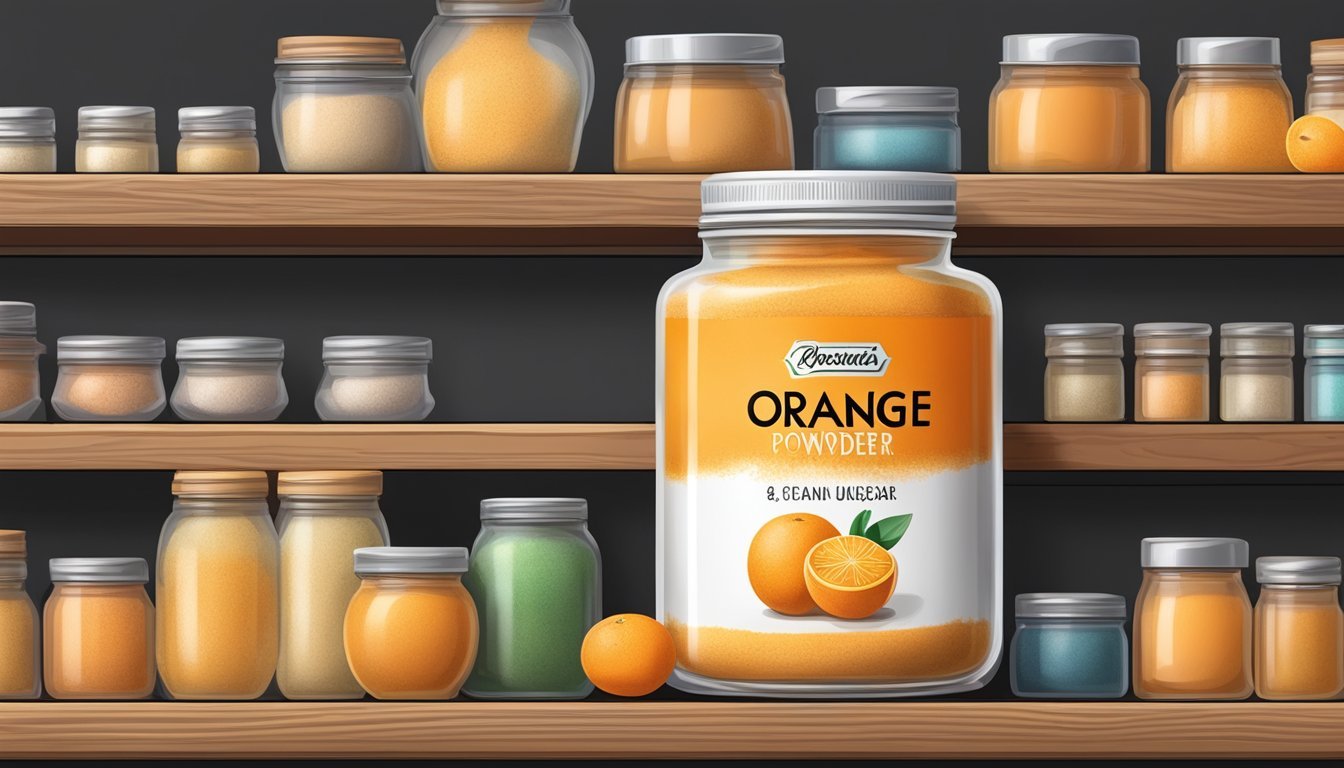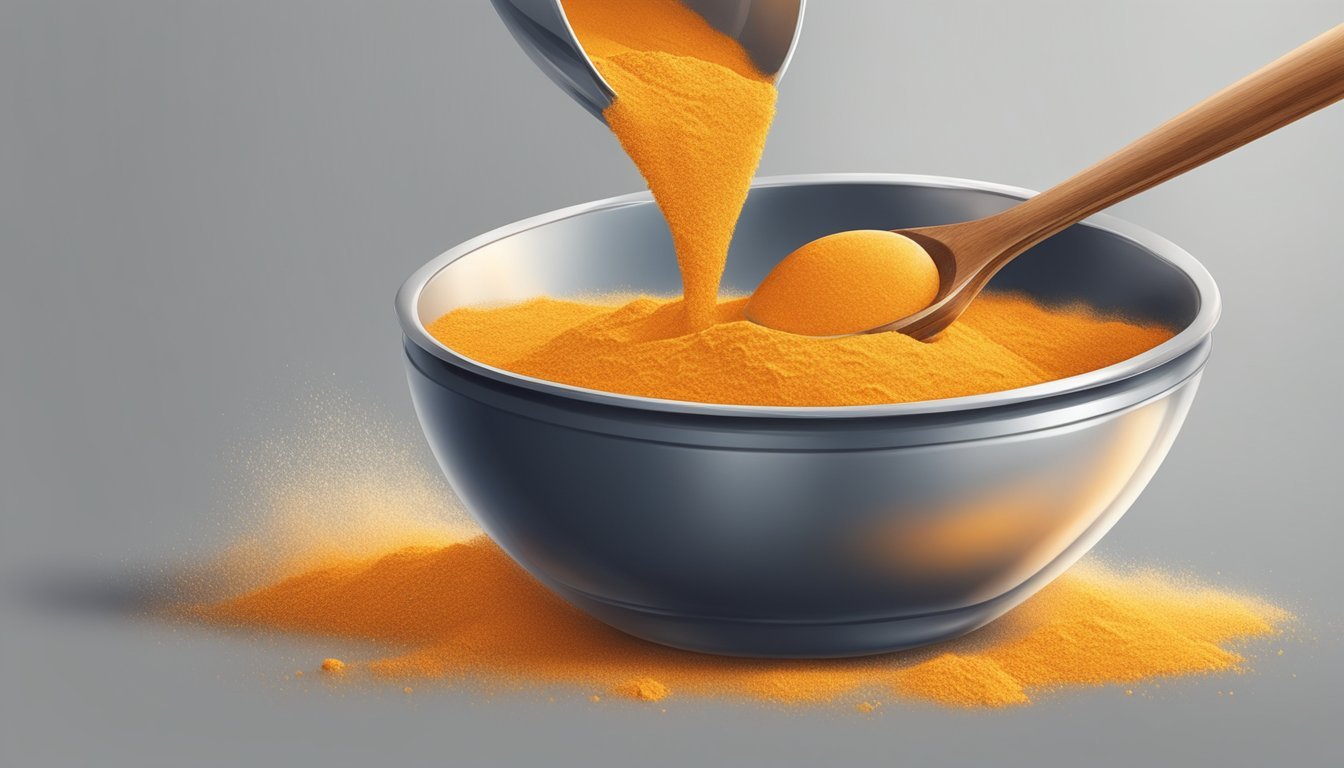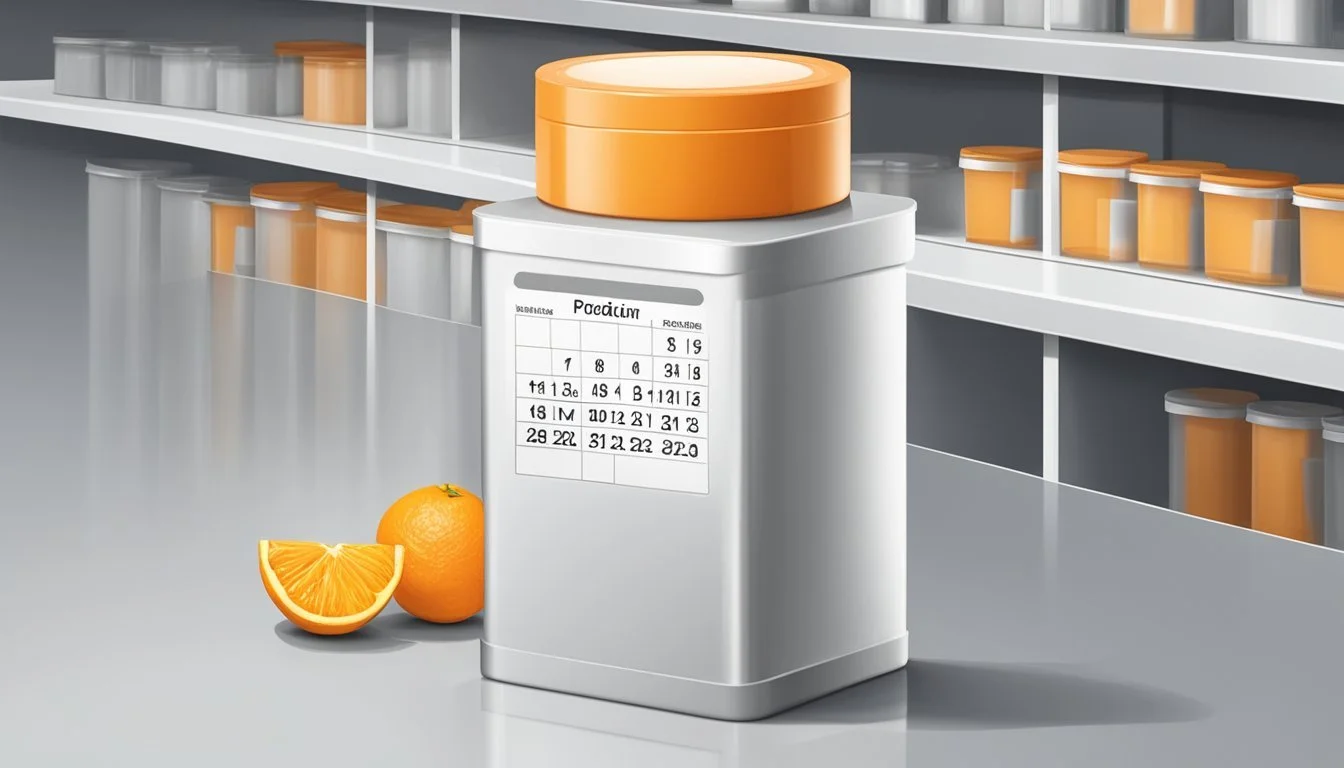How Long Does Orange Powder Last?
Shelf Life and Storage Tips
The longevity of orange powder is a topic of interest for consumers seeking to maintain the freshness and potency of their ingredients. Made from the rinds of oranges dehydrated and ground into a fine powder, orange powder serves as a convenient and concentrated flavoring agent in a variety of culinary applications. The shelf life of this item is subject to certain factors that include the initial quality of the orange rinds, the drying process, and the subsequent storage conditions.
Typically, orange powder can remain usable for up to one year when stored correctly, which involves keeping it in a cool, dry environment away from direct sunlight and moisture. An unopened packet or container of orange powder benefits from an extended shelf life because it has not been exposed to air or contaminants. Once opened, the powder should be used within six months to a year, after which it might begin to lose its vibrant flavor and aroma.
To achieve optimal preservation, orange powder should be stored in an airtight container. This practice helps prevent the absorption of moisture and neighboring scents, which could compromise the product's quality. Observing these storage guidelines ensures that orange powder retains its characteristics and remains a reliable ingredient in creating flavorful dishes.
Understanding Orange Powder
Orange powder, derived from dehydrated orange peels, serves as a versatile ingredient with a long shelf life. It offers a concentrated source of the flavors and health benefits found in oranges.
Overview of Orange Powder
Orange powder is crafted from the peels of oranges, which are carefully dried to remove all moisture and then ground into a fine powder. This powder is used for its zesty flavor, its natural color, and its nutritional properties, which are similar to that of a fresh orange.
Key features of orange powder:
Flavor: Intense and sweet with a hint of bitterness typical of citrus peels
Longevity: Can last up to a year when stored in an airtight container
Versatility: Used in cooking, baking, and natural beauty products
Nutrition: Rich in vitamin C and dietary fiber
Composition and Properties
Composition:
Vitamin C: Essential for immune system function and skin health
Fiber: Aids in digestion and supports regular bowel movements
Carbohydrates: Provides energy to the body
Properties:
Essential Oils: Contribute to the aroma and taste
Hygroscopic: Tends to absorb moisture, which can affect its shelf life
Stable: The drying process stabilizes the compounds, allowing for prolonged storage
Storage conditions heavily influence the powder's shelf life and efficacy; a cool, dry place away from direct sunlight preserves its quality.
Storage Fundamentals
Maximizing the shelf life of orange extract powder hinges on proper storage techniques. The following fundamentals are pivotal: controlling environmental variables, selecting appropriate storage containers, and minimizing exposure to degrading elements.
Storage Conditions
Storage conditions dramatically influence the lifespan of orange extract powder. It thrives in a cool, dry place away from fluctuating temperatures. Ideally, the powder should be kept at a consistent temperature, between 59°F (15°C) and 77°F (25°C), which usually equates to a typical pantry or cupboard away from any appliances that may emit heat.
Best Storage Containers
To maintain its potency, orange extract powder should be placed in an airtight container. Glass or metal containers with a secure seal offer the best protection against humidity and contaminants. Plastic containers can be used as long as they’re of food-grade quality and can seal tightly.
Impact of Light and Air Exposure
Continuous exposure to light and air can degrade the quality of orange extract powder. It's imperative to store the powder in a dark place or in an opaque, airtight container to block out light. Minimizing air exposure with a well-sealed container is vital, as air can carry moisture and odors that may affect the flavor and efficacy of the powder.
Shelf Life Determinants
The shelf life of orange powder hinges on various conditions and indicators of quality. Understanding these can help ensure the powder is used within its optimal period.
Factors Affecting Shelf Life
Storage Conditions: Orange powder should be kept in a cool, dry place, away from humidity and variations in temperature. The ideal temperature range for prolonged shelf life is 40°F to 70°F (4°C to 21°C).
Container Type: It is essential to store orange powder in an airtight container, made from non-reactive materials to prevent spoiling.
Seal Integrity: Unopened bottles tend to last longer due to the intact seal which protects against moisture and oxidation. Once opened, the countdown of shelf life accelerates.
Signs of Spoilage
Appearance: Changes in color may indicate spoilage. Orange powder that appears faded can suggest degradation.
Odor: A sour or unusual smell is a clear sign that the orange powder may have gone bad.
Texture: The presence of mold or clumping due to moisture implies spoilage.
Best By Date: While this is not an absolute expiration date, a product past its best by date may not have the same quality and safety as before and should be examined carefully.
Usage Tips
When incorporating orange powder into culinary creations, one should navigate the nuances of quantity, technique, and preservation to ensure that the intended flavor and aroma are impeccably imparted into the dish.
Incorporating Into Recipes
For dishes that typically use orange zest, orange powder can be a convenient alternative. It's versatile and can be added to baking recipes, sauces, or even teas for a citrusy kick. While baking, a person can sprinkle it onto a baking sheet with cookies or bread to infuse subtle orange undertones. In sauces, it melds well with sweet and savory profiles.
Optimizing Flavor and Aroma
The key to maximizing the flavor and aroma of orange powder lies in when and how it's added to recipes. They should introduce orange powder early in the cooking process for dishes with a longer cooking time, which allows its flavor to develop fully. However, for baking or quick-cook recipes, adding it at the end preserves its potent aroma. To safeguard its zestfulness, one must store it away from heat and light sources.
Quantity and Measurement
The right amount of orange powder can make or break a recipe. As a rule of thumb, a person should consider the following conversions:
1 tsp orange zest = 1/2 tsp dried orange peel powder
Careful measurements ensure the orange powder complements the other ingredients without overpowering them. One must adjust the amount based on whether they seek a whisper or a shout of orange flavor in their dishes.
Preservation Techniques
Proper preservation techniques are essential for extending the shelf life of orange powder. By utilizing methods such as freezing and dehydration, one can maintain the quality and flavor of the product for future use.
Freezing Tips
When preserving orange powder, freezing is a viable option. To ensure optimal freshness, one should use an airtight container or a sealable freezer bag. Storage in a consistent temperature at 0°F (-18°C) keeps the orange powder from absorbing moisture and odors, potentially lasting for several months.
DIY Dehydration Process
For those preferring a DIY approach to preserve orange peels before grinding them into powder, dehydration is key. One can use a dehydrator or an oven set to the lowest temperature. Arrange the peels in a single layer and periodically turn them to ensure an even drying process. The result is a homemade orange powder with a significantly extended shelf life when stored properly in a cool, dry place.
Health and Nutritional Information
Orange powder, derived from dehydrated ground orange peels, offers a concentrated form of the nutritional benefits typically found in fresh oranges. It is especially rich in certain vitamins and fiber, providing multiple health potentials.
Vitamins and Health Benefits
Orange powder is notably high in vitamin C, an essential nutrient that bolsters the immune system, has anti-inflammatory properties, and potentially possesses anti-cancer qualities. Regular intake of vitamin C can help an individual maintain good health and may protect against various ailments. In addition, the powder contains other health promoting compounds which are linked to improving digestion and aiding in regular bowel movements due to its fiber content.
Nutritional Content
Nutrient Benefit Fiber Supports digestion and regular bowel movements Vitamins Essential for overall health Calcium Aids in bone health Folate Important for cell function and tissue growth Potassium Essential for heart and muscle functions
In terms of specific nutritional content, orange powder also provides a source of other valuable nutrients such as folate, calcium, and potassium. These nutrients are involved in critical body functions that range from muscle contraction to heart health and blood pressure regulation.
Specialty Uses
Orange powder is not only a culinary delight but also an asset in beauty and household applications. It serves as a natural ingredient in various products, ensuring an environmentally friendly and chemical-free alternative.
In Beauty and Skincare
Face Masks: He or she can utilize orange powder as a primary ingredient in face masks, known for its brightening properties. A tablespoon of orange powder mixed with equal parts of honey or yogurt creates a revitalizing mask that can help to refresh and smooth the skin.
Skincare Routines: For those seeking a natural exfoliant, incorporating a teaspoon of homemade orange powder into daily skincare routines can gently remove dead skin cells without the harsh chemicals found in many store-bought scrubs.
For Cleaning and Refreshing
Homemade Cleaning Products: Orange powder's citrusy scent makes for a pleasant and effective addition to homemade cleaning products. A mixture of orange powder and vinegar can help to refresh surfaces and eliminate odors without the use of synthetic fragrances.
Natural Refreshing: To naturally refresh the air in one's home, a person might simmer water with a sprinkle of orange powder, releasing a subtle, clean fragrance. This can eliminate the need for chemical air fresheners, promoting a healthier living environment.
Product Lifespan Optimization
To guarantee the best quality and preserve the integrity of orange powder, one must focus on maintaining freshness and extending usability. These methods ensure the potency, flavor, and aroma are retained for as long as possible.
Maintaining Freshness
Storage: Store orange powder in a cool, dark area away from direct sunlight to prevent the degradation of essential oils.
Airtight Containers: Use airtight containers to protect against moisture and contaminants that can hasten aging.
Minimal Exposure: Limit the exposure to air by sealing the powder promptly after use to preserve its refresh capacity.
Extending Usability Beyond Best By Date
Sensory Test: Regularly test the aroma and flavor to assess potency, as these characteristics may indicate whether the orange powder remains within its best quality phase.
Dry Environments: Keeping orange powder in a dry environment can extend its shelf life beyond the best by date, but one should always test before use to ensure flavor and aroma have not diminished.
Creative Culinary Applications
Orange powder, with its condensed citrus flavor, offers a versatile addition to a variety of recipes. It imbues dishes and beverages with a distinct orange essence without altering their texture.
Baking Variants
Bakers can integrate orange powder into a range of sweet confections. Incorporating it into cake and muffin mixes bestows a vibrant orange flavor that fresh or liquid alternatives cannot match in intensity. It is especially well-suited for pound cake and cookies, where the powder's fine texture distributes the citrus flavor evenly.
Cakes: Add a tablespoon to the batter for a zesty twist.
Cookies: Mix half a teaspoon into the dough for a subtle citrus hint.
Savory Dish Enhancements
Chefs incorporate orange powder into salad dressings, rubs, and marinades to impart a bold citrus undertone. It pairs particularly well with seafood, enhancing the dish's natural flavors. In sauces and soups, the powder can offer a surprising layer of flavor complexity.
Salad Dressings: A dash of orange powder lifts the dressing's profile.
Seafood Rubs: Combine with herbs for a refreshing seasoning.
Drink and Beverage Flavors
Orange powder is a fantastic ingredient for flavoring tea, smoothies, and other beverages, adding a pleasant acid note that can brighten up the drink. Its powdered form allows for seamless integration without the need for straining out solids.
Tea: Stir in a pinch for a citrus-infused brew.
Smoothies: Blend in a teaspoon for an instant burst of orange flavor.
Alternatives and Substitutes
When orange powder is not available, certain substitutes can be used in cooking and baking to achieve a similar citrus flavor. These alternatives vary in flavor intensity and form, and can often be found either in commercial forms or created at home.
Substitutes for Orange Powder in Recipes
Orange Zest or Peel: Freshly grated orange zest or dried orange peel can be used as a substitute. Typically, one tablespoon of orange zest can replace a teaspoon of orange powder.
Orange Extract: A concentrated form made from the oils of orange peel, orange extract is potent and should be used in smaller quantities. About half a teaspoon can substitute for a teaspoon of orange powder, although dilution with water is recommended.
Commercial and Homemade Alternatives
Commercial Orange Flavoring: Various brands offer orange flavoring that can work as a substitute for orange powder. They are usually formulated to closely mimic the flavor of fresh oranges.
Homemade Orange Peel Powder: One can dry orange peels at home and grind them into a fine powder as an alternative to store-bought orange powder. This process ensures a natural and pure flavor.











